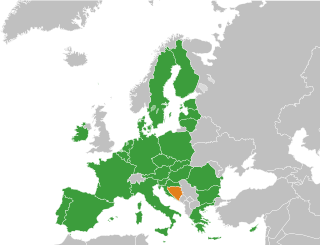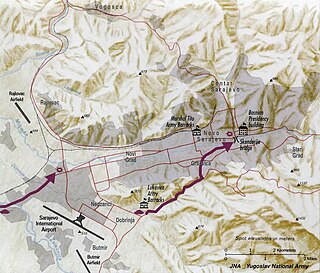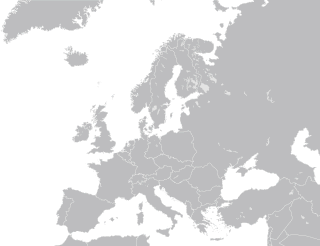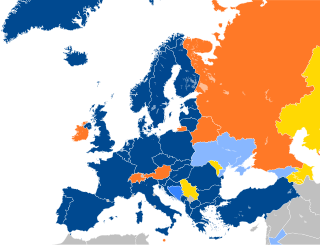| |||||
| Decades: | |||||
|---|---|---|---|---|---|
| See also: | |||||
The following lists events that happened during 2010 in Bosnia and Herzegovina .
| |||||
| Decades: | |||||
|---|---|---|---|---|---|
| See also: | |||||
The following lists events that happened during 2010 in Bosnia and Herzegovina .

The Partnership for Peace is a North Atlantic Treaty Organization (NATO) program aimed at creating trust and cooperation between the member states of NATO and other states mostly in Europe, including post-Soviet states; 18 states are members. The program contains 6 areas of cooperation, which aims to build relationships with partners through military-to-military cooperation on training, exercises, disaster planning and response, science and environmental issues, professionalization, policy planning, and relations with civilian government. During policy negotiations in the 1990s, a primary controversy regarding PfP was its ability to be interpreted as a program that is a stepping stone for joining NATO with full Article 5 guarantees.

The Bosnian War was an international armed conflict that took place in Bosnia and Herzegovina between 1992 and 1995. The war is commonly seen as having started on 6 April 1992, following a number of earlier violent incidents. The war ended on 14 December 1995 when the Dayton accords were signed. The main belligerents were the forces of the Republic of Bosnia and Herzegovina, the Republic of Herzeg-Bosnia, and the Republika Srpska, the latter two entities being proto-states led and supplied by Croatia and Serbia, respectively.
The Death of Yugoslavia is a BBC documentary series first broadcast in September and October 1995, and returning in June 1996. It is also the title of a BBC book by Allan Little and Laura Silber that accompanies the series. It covers the collapse of Yugoslavia, the subsequent wars and the signing of the final peace accords. It uses a combination of archived footage interspersed with interviews with most of the main players in the conflict, including Slobodan Milošević, Radovan Karadžić, Franjo Tuđman and Alija Izetbegović, as well as members of the international political community, who were active in the various peace initiatives.

The University of Sarajevo is a public university located in Sarajevo, Bosnia and Herzegovina. It is the largest and oldest university in the country, tracing its initial origins to 1537 as an Islamic madrasa.

Fikret Abdić, also known as Babo, is a Bosnian politician and businessman who first rose to prominence in the 1980s for his role in turning the Velika Kladuša-based agriculture company Agrokomerc into one of the biggest conglomerates in SFR Yugoslavia. He won the popular vote in the Bosnian presidential elections of 1990.

Individual Partnership Action Plans (IPAP) are plans developed between NATO and different countries which outline the objectives and the communication framework for dialogue and cooperation between both parties. NATO launched the IPAPs initiative at the 2002 Prague Summit.

The accession of Bosnia and Herzegovina to the European Union (EU) is the stated aim of the present relations between the two entities. Bosnia and Herzegovina has been recognised by the European Union as a "candidate country" for accession since the decision of the European Council in 2022 and is on the current agenda for future enlargement of the EU. Bosnia and Herzegovina takes part in the Stabilisation and Association Process and trade relations are regulated by an Interim Agreement.

The 1992 Yugoslav People's Army column incident in Sarajevo occurred on 3 May 1992 in Dobrovoljačka Street, Sarajevo, when members of the Bosnian army (ARBiH) attacked a convoy of the Yugoslav army (JNA) troops that were exiting the city of Sarajevo according to the withdrawal agreement.

Krešimir Zubak is a Bosnian Croat politician who served as the 1st Croat member of the Presidency of Bosnia and Herzegovina from 1996 to 1998. At the beginning of the Bosnian War in 1992, he joined the Croatian Democratic Union.

Državna Tajna is a book by Semir Halilović, son of Bosnian general Sefer Halilović, published in 2005. The book has the tagline "STROGO POVJERLJIVO"

NATO is a military alliance of thirty-two European and North American countries that constitutes a system of collective defense. The process of joining the alliance is governed by Article 10 of the North Atlantic Treaty, which allows for the invitation of "other European States" only and by subsequent agreements. Countries wishing to join must meet certain requirements and complete a multi-step process involving political dialogue and military integration. The accession process is overseen by the North Atlantic Council, NATO's governing body. NATO was formed in 1949 with twelve founding members and has added new members ten times. The first additions were Greece and Turkey in 1952. In May 1955, West Germany joined NATO, which was one of the conditions agreed to as part of the end of the country's occupation by France, the United Kingdom, and the United States, prompting the Soviet Union to form its own collective security alliance later that month. Following the end of the Franco regime, newly democratic Spain chose to join NATO in 1982.
Ejup Ganić is a Bosnian engineer and politician who is the founder and chancellor of Sarajevo School of Science and Technology.

Serbia, as a constituent subject of the SFR Yugoslavia and later the FR Yugoslavia, was involved in the Yugoslav Wars, which took place between 1991 and 1999—the war in Slovenia, the war in Croatia, the war in Bosnia, and Kosovo. From 1991 to 1997, Slobodan Milošević was the President of Serbia. The International Criminal Tribunal for the Former Yugoslavia (ICTY) has established that Milošević was in control of Serb forces in Bosnia and Herzegovina and Croatia during the wars which were fought there from 1991 to 1995.

The accession of Bosnia and Herzegovina to NATO has been under negotiations since 2008.

The Maryland–Bosnia and Herzegovina National Guard Partnership is one of 25 European partnerships that make-up the U.S. European Command State Partnership Program and one of 88 worldwide partnerships that make-up the National Guard State Partnership Program. The partnership was established in 2003 and has become integral to Bosnia and Herzegovina's post-war military integration and in their ongoing NATO accession process. The current focus is on a joint-deployment to Afghanistan, AT exchanges with key BiH units, and supporting BiH's NATO Partnership for Peace goals.

NATO maintains foreign relations with many non-member countries across the globe. NATO runs a number of programs which provide a framework for the partnerships between itself and these non-member nations, typically based on that country's location. These include the Euro-Atlantic Partnership Council and the Partnership for Peace.
The Sandžak faction or Sandžak lobby, known in Bosnian as Sandžaklije, was one of the two main divisions of the Bosnian government and the ruling Party of Democratic Action (SDA) during the Bosnian War. It was made up of military hardliners and settlers (migrants) from Sandžak, a region divided between SR Serbia and SR Montenegro. Commander Sefer Halilović and politician Ejup Ganić belonged to the faction.

Sakib Mahmuljin is a Bosniak politician and former military leader who served as the commander of the 3rd Corps of the Army of the Republic of Bosnia and Herzegovina (ARBiH) during the Bosnian War. After the war, he was convicted of committing war crimes against Bosnian Serb prisoners and sentenced to eight years' imprisonment.

The Embassy of the Republic of Indonesia in Budapest is the diplomatic mission of the Republic of Indonesia to the Republic of Hungary. The first Indonesian ambassador to Hungary was Sarino Mangunpranoto (1962–1966). The current ambassador, Abdurachman Hudiono Dimas Wahab, was appointed by President Joko Widodo on 7 January 2019.

Vladimir Šoljić is a Bosnian Croat politician who served as the second President of the Federation of Bosnia and Herzegovina in 1997.